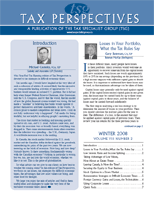
PDF Format
 Issue Contents Issue Contents
 All Issues All Issues
Winter 2008
Volume 8, Number 2
The information in Tax Perspectives is prepared for general interest only. Every effort has been made to ensure that the contents are accurate. However, professional advice should always be obtained before acting and TSG member firms cannot assume any liability for persons who act on the basis of information contained herein without professional advice.
Stock Options in a Down Market
By Manu Kakkar, CA, CGA, TEP
Manu Kakkar CA Inc. (London, Ontario; Montreal, Quebec)
Nothing lasts forever. Relationships can go from good to bad in a heartbeat. An economy can go from riches to rags in the blink of an eye. The U.S. stock market, save for some groundbreaking federal intervention, was apparently on the brink of financial collapse. The volatility of the U.S. stock market has had an understandably similar effect on the Canadian stock markets.
The initial reaction of those trading on the Canadian stock market would be to sell, to improve liquidity in these recessionary times. The obvious downside to this strategy is the economic loss that can occur on the sale.
For executives of public companies, there can be very serious income tax consequences if they exercise their options and subsequently sell the shares at less than the exercise price. The balance of this article will discuss two of the unforeseen problems arising from the exercise of stock options of public companies.
The first potential pitfall of exercising stock options is that the employment benefit from exercising them may be greater than the current trading price of the stock. Let us use an example to illustrate: Assume Mr. X exercises his public company stock option when the stock is worth $20 and that he pays no consideration for the shares.
Mr. X’s employment benefit is $20 per share and this will also be the cost of his shares. Let us say that the next day – not farfetched in this volatile market – the stock plummets to $5 per share. Although the economic gain to Mr. X would also fall to $5 per share, the taxable benefit from his employment is fixed at the time of the option exercise: i.e. $20 per share. His tax on this amount will be around $9 per share.
As a further problem, the $15 capital loss per share ($20 - $5) arising on the sale of Mr. X’s public company shares could be offset against capital gains, not against the $20 per share employment income benefit. Mr. X would have been better off holding the shares rather than selling them, because he would otherwise pay more tax than his economic gain.
The second potential problem lies with the quantum of the taxable employment income that Mr. X has to report in the year of disposition. Mr. X would have $20 per share of employment income. A 50% reduction in employment income will be available to Mr. X if the price he must pay to exercise the option is not less than the stock price at the time of the option grant ($20). In this market, Mr. X would be foolish to exercise his stock option on these terms.
Let us assume that because of the economic downturn, the public company wishes to consider alternatives to make the stock option program more attractive. Scenario 1: Cancel the old option agreement and create a new option agreement with an exercise price of $5per share. Scenario 2: Reprice the current option agreement to $5 per share.
In the first scenario, Mr. X would be allowed a deduction equal to 50% of the employment income upon exercise because the new option agreement is considered to be distinct from the old option agreement.
In the second scenario, under current tax rules, Mr. X would be subject to full taxation on his employment income, because repricing the option is in respect of the same option agreement. Because the share exercise price ($5) is less than the share price at the time of the option grant ($20), the 50% deduction is not available to Mr. X.
Proposed legislation attempts to bring the tax result of the second scenario in line with the first scenario if certain conditions are met.
Appropriate tax planning is always needed regardless of the overall economic situation. Exercising a stock option is a risky strategy in a volatile market, especially if you plan to retain the stock!
|